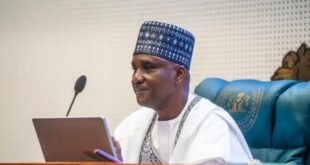The National Assembly’s joint committee on Agriculture Production Services and Rural Development met with the Minister of Agriculture and Food Security, Abubakar Kyari, and his Minister of State, Sabi Abdullahi, on Tuesday.
The meeting aimed to find a solution to the high cost of food prices and make it more affordable and accessible to the people.
During the meeting, the joint committee, chaired by Senator Saliu Mustapha (APC Kwara Central), asked the ministers about their plans to tackle the issue of high food prices.
In response, Minister Kyari explained that the federal government has started distributing 42,000 metric tons of grains to state capitals across the country.
He also mentioned that 58,500 metric tons of milled rice from mega rice millers would be released into the market for stabilization.
In addition to these measures, the federal government is working with the Office of the National Security Adviser and other national security agencies to address the issue of vandalization of food warehouses in the country.
This collaborative approach, according to Senator Mustapha, is a step in the right direction to ensure that Nigerians will have a better experience with the government’s food security policy.
Meanwhile, a new $500 million food security program supported by the World Bank and the federal government has been designed for the people of Kwara State.
The Livestock Productivity and Resilience Support Project (L-PRES) aims to provide platforms for livestock value chain production and commercialization in the state.
At the flag-off of the program in Ilorin, Governor AbdulRahman AbdulRazaq emphasized the importance of the livestock sector in the state’s economy and its potential to improve the livelihoods of smallholder farmers.
He also highlighted the need for improved coordination and synergy between the L-PRES and other similar projects to ensure their successful implementation.
The Nigerian government is taking decisive steps to address the food crisis in the country by engaging with relevant stakeholders, distributing food resources, and implementing new projects to improve the livestock sector.
These efforts aim to make food more affordable and accessible to the people and to reduce the conflict between farmers and herders.
Subscribe to the Advocate News letter and receive news updates daily in your inbox.
 Advocate.ng Latest news update on politics, entertainment, sport and more
Advocate.ng Latest news update on politics, entertainment, sport and more




